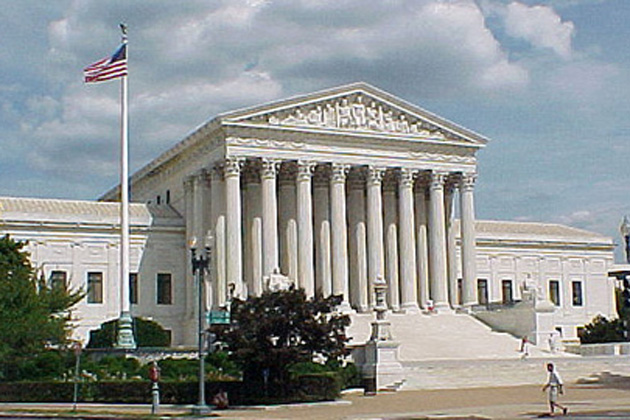
By Greg Bishop/Illinois Radio Network
WASHINGTON, D.C. – The U.S. Supreme Court on Wednesday ended the practice of forcing public sector workers to pay union fees as a condition of employment.
In a 5-4 decision, the Supreme Court ruled in favor of Mark Janus in his First Amendment lawsuit against the AFSCME Council 31.
The decision means Janus, a child support specialist for the Illinois Department of Healthcare and Family Services, no longer has to pay what the union calls “fair share” fees for AFSCME’s representation of him.
Writing for the majority, Justice Samuel Alito said forced agency fees are in fact unconstitutional on First Amendment grounds.
“Neither an agency fee nor any other payment to the union may be deducted from a nonmember’s wages, nor may any other attempt be made to collect such a payment, unless the employee affirmatively consents to pay,” Alito wrote.
The decision affects about five million public employees in 22 states without right-to-work laws. They now will be able to join Janus in deciding for themselves whether they want to pay union fees. Colorado, Illinois, Minnesota, New Hampshire, Ohio and Pennsylvania are among the other states that are impacted.
Conservative Justice Neil Gorsuch, Donald Trump’s appointee to the bench, cast the decisive vote.
In a very similar case in 2016, the Supreme Court deadlocked, 4-4. In that split decision, Friedrichs vs. the California Teachers Association, justices appeared ready to overturn a four-decades-old precedent and ban states from requiring a public employee to pay fees to unions who represent them even if the employee doesn’t support the union or want its collective bargaining help. But conservative Justice Antonin Scalia died before he could cast the deciding vote.
Gorsuch replaced Scalia on the bench last year.
In Janus vs. AFSCME, the 10-year Illinois state worker challenged a law that required him to contribute part of his paycheck – $45 a month – to a union he decided not to join and one he disagrees with politically.
Union advocates have said the dues Janus pays to AFSCME are his “fair share” for the collective bargaining on wages, benefits and workplace conditions that the union does on his behalf. Janus countered that, regardless of the amount he is forced to pay, collective bargaining itself is a form of politicking that he shouldn’t have to financially support.
Janus has said from day one of his legal battle that he is not anti-union. He said his First Amendment rights guaranteeing him freedom of association were being violated.
Among the rights guaranteed in the First Amendment of the U.S. Constitution is the right to assemble. That right has been broadly interpreted to include the rights of Americans to associate, “peaceably,” with whom they want. That also includes the rights of Americans to not associate with those whom they don’t want.
By taking a portion of his paycheck against his will, Janus successfully argued he was being forced to associate with a union whose policies he doesn’t support.
“I’m thrilled that the Supreme Court has restored not only my First Amendment rights, but the rights of millions of other government workers across the country,” Janus said. “So many of us have been forced to pay for political speech and policy positions with which we disagree, just so we can keep our jobs. This is a victory for all of us. The right to say ‘no’ to a union is just as important as the right to say ‘yes.’ Finally our rights have been restored.”
Wednesday’s ruling nullifies a 41-year-old precedent established in Abood vs. Board of Education, in which the Supreme Court then upheld union fees. Alito said that opinion was wrong.
“Fundamental free speech rights are at stake. Abood was poorly reasoned,” Alito said. Abood “has led to practical problems and abuse. It is inconsistent with other First AMendment cases and has been undermined by more recent decisions.”
Unions quickly criticized the decision.
“Today’s Supreme Court decision in Janus v AFSCME was based on a bogus free speech argument,” Paul Shearon, secretary treasurer of the International Federation of Professional and Technical Engineers, said in a statement. “This politically motivated case brought by Mark Janus, paid for by corporate interests, was designed to undercut the bargaining power of those employed in local and state government. This wasn’t about free speech – this was about silencing workers’ voices.”
Jacob Huebert, Janus’ attorney from the Liberty Justice Center, countered.
“This is the biggest victory for workers’ rights in a generation,” Huebert said in a statement. “The First Amendment guarantees each of us, as individuals, the right to choose which groups we will and won’t support with our money. Today the Supreme Court recognized that no one should be forced to give up that right just to be allowed to work in government. The Court recognized that unions have the right to organize and to advocate for the policies they believe in – but they don’t have a special right to force people to pay for their lobbying. They have to play by the same rules as everyone else.”
Gorsuch was joined in the majority by conservatives Chief Justice John Roberts and Justices Alito, Clarence Thomas and Anthony Kennedy.
Dissenting were liberal Justices Ruth Bader Ginsburg, Stephen Breyer, Elena Kagan and Sonia Sotomayor.






